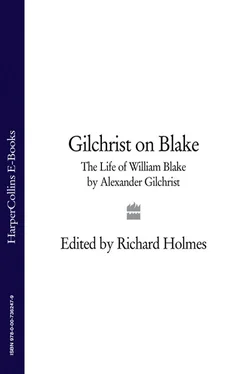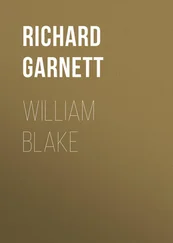So not only had the whole Rossetti family now rallied round Anne’s ‘Herculean labour’, but the two volume work had almost become a group enterprise, a Pre-Raphaelite project to restore Blake, and to do honour to his young idealistic biographer. As Dante Gabriel wrote to Anne, ‘I would gladly have done it for Blake’s or gladly for your husband’s or gladly for your own sake, and moreover, had always had a great wish of my own to do something in this direction…’
The twin volumes were to be delivered twelve months later, in spring 1863.
Who, then, finally wrote Gilchrist’s Life of William Blake?
It is clear from their correspondence, that the Rossettis almost entirely confined themselves to the editorial work on the second volume alone. Dante Gabriel was asked to write a ‘Supplementary’ summary (Chapter 39, no longer included); and to fill in a missing description of Blake’s Book of Job (Chapter 32), ironically the very work that had first drawn Gilchrist to Blake. Apart from that, they touched virtually nothing in the first volume, because they were not permitted to. Anne regarded the text of the biography as a sacred to Gilchrist’s memory. She was its sole guardian. ‘I think you will not find it hard to forgive me a little reluctance,’ she wrote to William Rossetti, ‘that any living tones should blend with that voice which here speaks for the last time on earth.’
But how far she herself added new materials from Alexander’s notes, or made stylistic changes, must remain more problematic. In April 1862 she was speaking of ‘incorporating all the additional matter contained in the notes’ into a final draft, which sounds quite radical. But by the end of May, the position was almost reversed. ‘I am glad to say I find the Manuscript even more complete than I anticipated, and that a large mass of Notes which I had thought contained new matter, were merely for reference and verification.’ To the end of her days Anne insisted that she was nothing more than her husband’s ‘editor’. But since Gilchrist’s original manuscript has not survived, there is no way of knowing precisely how she understood this role.
However, it is difficult to find evidence of any large editorial additions or interventions. For example, Alexander had frequently lamented his failure to develop any proper critical commentary on the poetry (as opposed to the illuminations) of Blake’s ‘Prophetic Books’. Anne was clearly tempted to remedy this. ‘I found the only grave omission in the book – the only place where dear Alec had left an absolute blank that must be filled in – was for some account of Blake’s mystic writings, or ‘Prophetic Books’, as he called them.’
But although she consulted with Rossetti, she did not in the end attempt to add any significant commentary, writing ruefully: ‘I could heartily wish the difficult problem presented by these strange Books had been successfully grappled with, or indeed grappled with at all. Hardly anything has now been attempted beyond bringing together a few readable extracts…They are at least psychologically curious and important.’ The omission is very clear, for example in the desultory remarks on Jerusalem in Chapter 21, despite the fact that Anne had meticulously copied out the entire text by hand, from a rare copy loaned with great reluctance (‘only for a week’) by Monckton Milnes.
In fact, she seems to have conceived her main role as protecting what Alexander had written and quoted. There was some need for this. The genial Palmer was desperate to avoid anything that hinted at ‘blasphemy, while Macmillan was acutely nervous of Blake’s erotic writing; he anxiously read every line of the proofs, and questioned even single lines from the poems, especially those from The Daughters of Albion’. William Rossetti wrote: The pervading idea of “The Daughters of Albion” is one which was continually seethling in Blake’s mind, and flustering Propriety in his writings…It is the idea of the unnatural and terrible result in which, in modern society, ascetic doctrines in theology and morals have involved the relations of the sexes…in [this] cause he is never tired of uprearing the banner of heresy and non-conformity.’
Anne replied on 3 October 1862: ‘I am afraid you will be vexed with me…But it was no use to put in what I was perfectly certain Macmillan (who reads all the proofs) would take out again…It might be well to mention to Mr Swinburne that it would be perfectly useless to attempt to handle this side of Blake’s writings – that Mr Macmillan in far more inexorable against any shade of heterodoxy in morals, than in religion…in fact poor “flustered Propriety” has to be most tenderly and indulgently dealt with.’
She was beset by other diplomatic problems. One of the original Ancients, the painter John Linnell, offered to oversee all the proofs, but made it clear that he would alter the text where he did not approve of it. Anne knew that Alexander had already rejected this idea long before: ‘the bare notion of it filled him with horror: I do not think he ever showed proof or manuscript to the most congenial friend even.’ This was a policy that Anne clearly intended to continue.
Alexander had made the ‘most minute notes’ of all Linnell told him, but believed there was ‘considerable divergency’ in their view of the facts. ‘Besides,’ concluded Anne, ‘a biographer’s duty often is to balance the evidence of conflicting witnesses.’ To have acceded to Linnell would, she felt sure, have been ‘a most imprudent, and indeed treacherous thing on my part.’
There were other difficulties among the survivors, and keepers of the flame. Frederick Tatham had quarreled with Linnell over the ownership of some of Blake’s Dante drawings, and Anne believed that Tatham had also imposed on Blake’s widow by silently selling off many of his engraved books over ‘thirty years’. Such post-mortem disputes between the Ancients were peculiarly confusing to Anne. Yet she retained absolute confidence in Alexander’s view of the situation. ‘My husband, who had sifted the matter, and knew both parties, thought Linnell an upright and truthful, if somewhat hard man, and that towards Blake his conduct had been throughout admirable. He also inclined to think, that Mrs Blake retained one trait of an uneducated mind – an unreasonable suspiciousness…’ Here, she was in fact quoting Gilchrist’s own words from the biography.
She was however dismayed to discover that Tatham, in a fit of religious zeal, had much later destroyed many of Blake’s manuscripts. For a biographer this was itself the ultimate sin, and would have appalled Alexander. She wrote angrily to Rossetti, saying that Tatham had come to believe that Blake was indeed inspired, ‘but quite from a wrong quarter – by Satan himself – and was to be cast out as an “unclean spirit”.’ This was a ghastly parody of Gilchrist’s subtle, secular, psychological appreciation of Blake’s profound eccentricity and originality. She would have nothing to do with it.
The most challenging editorial problem arrived last. In January 1863, when the biography was already printing, Anne was sent ten precious letters of Blake’s to his young publisher and patron, Thomas Butts. At a stroke, this doubled the number of surviving letters. They all dated from the crucial – and little known – period of creative renewal, when Blake retired to a tiny cottage in Felpham, Sussex, between 1800 and 1804. These gave a wholly new insight into Blake’s character, his views of his art and patronage, and some wonderful examples of his most limpid but visionary prose.
The villagers of Felpham are not mere rustics; they are polite and modest. Meat is cheaper than in London; but the sweet air and the voices of winds, trees, and birds, and the odours of the happy ground, make it a dwelling for immortals. Work will go on here with God-speed. A roller and two harrows lie before my window. I met a plough on my first going out at my gate the first morning of my arrival, and the ploughboy said to the Ploughman, ‘Father, the gate is open.’
Читать дальше












